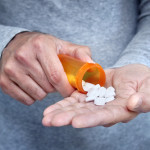The novel coronavirus that emerged in late 2019 (officially known as SARS-CoV-2) raises new concerns for people living with HIV, ranging from worry about contracting the new virus to issues related to medication supplies and uninterrupted access to medical care.
COVID-19, the respiratory disease caused by the new coronavirus, is mild to moderate in about 80% of cases. The most common symptoms are fever, cough and shortness of breath, but some people have no symptoms. About one in five will develop severe disease that may progress to pneumonia and acute respiratory distress syndrome that requires a mechanical ventilator. COVID-19 lung damage is partly caused by the virus and partly by the immune system’s response to it.
While anyone can develop severe COVID-19, certain people are at greater risk, namely people over age 60, those with compromised immune systems and people with underlying health conditions such as chronic lung disease, heart disease, diabetes or high blood pressure.
Most experts agree that HIV-positive people who are on antiretroviral treatment and have an undetectable viral load and a high CD4 count are not at greater risk of contracting the coronavirus or developing severe illness.
However, people with uncontrolled HIV and those with low CD4 counts despite effective treatment may be more susceptible. What’s more, many people living with HIV are older and have other health conditions that put them at risk. Reducing COVID-19 risk is one more reason for starting antiretroviral therapy promptly and maintaining good adherence.
Everyone who has not yet had the coronavirus should take precautions to prevent COVID-19, but these are particularly important for anyone who falls into higher-risk categories. Antibody tests may show whether someone has developed immunity that should offer some protection against future infection, but it is not yet clear whether it does orhow long such immunity might last.
Prevention measures include staying away from people who are sick—and avoiding others if you are sick—washing your hands thoroughly, using hand sanitizer containing at least 60% alcohol, wearing a cloth face mask and not touching your mouth, nose or eyes. Get your annual flu shot, and ask your doctor whether you should get a vaccine to prevent bacterial pneumonia.
If you’re at higher risk, social distancing remains important even after local stay-at-home orders are relaxed. Avoid crowds, work from home if you can and try to stay at least six feet away from people you don’t live with.
If you think you have been exposed to the virus, stay at home and seek advice from your care provider. If you have mild symptoms, you may be able to manage them at home by drinking plenty of fluids and using over-the-counter fever, cough and pain medications. Get further care if you have trouble breathing. Call ahead before you go to a clinic or hospital.
Experts recommend keeping at least a 30-day supply of your medications in case of supply disruptions or if you are confined to your home. This can be difficult due to cost and insurance requirements, but some insurers have changed their policies during the crisis.
Many people living with and at risk for HIV are having less sex due to social distancing. If you’re taking daily pre-exposure prophylaxis (PrEP) and not having sex, you can stop taking the prevention med. When it’s time to restart, taking PrEP for a week should provide full protection. Some people can use Truvada (tenofovir disoproxil fumarate/emtricitabine) on an intermittent, or 2-1-1, schedule (two doses taken two to 24 hours before anticipated sex, one dose 24 hours after the initial double dose and a final dose 24 hours after that).
There are currently no approved treatments for COVID-19, but hundreds of studies are underway. Be cautious about rumors and overly optimistic information about treatments that have not been proved effective in randomized clinical trials.
Some HIV medications have shown activity against SARS-CoV-2 in laboratory and animal studies. A recent clinical trial of Kaletra (lopinavir/ritonavir) found that it did not work significantly better than supportive care overall, but it may be helpful for those treated early. However, there is no evidence that HIV drugs can prevent coronavirus infection or the development of severe COVID-19 disease.
Many SARS-CoV-2 vaccine trials are also ongoing. Experts predict a vaccine may be available by the end of 2021.







1 Comment
1 Comment